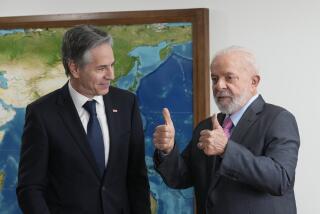New Brazil Leader Promises Growth, Social Justice : Latin America: President Cardoso, at inauguration, tells buoyant nation its time has come to ‘flourish.’
- Share via
BRASILIA, Brazil — A buoyant Brazil started the New Year by inaugurating a new president, sociologist-turned-politician Fernando Henrique Cardoso, who promised Sunday to lead Latin America’s biggest country into a long period of economic growth with social justice.
“We have recovered our confidence in development,” said Cardoso, 63. “The time has come to grow and flourish.”
The new president expressed a national mood of optimism that he helped bring on as finance minister last year, when he launched a popular economic stabilization program. It has reduced inflation dramatically and raised hopes for further economic progress after more than a decade of economic disorder and decline.
“This year will be better, and next year better still,” Cardoso predicted in a speech after taking the oath of office Sunday afternoon. “Today, there is no serious specialist who foresees anything for Brazil but a long period of growth.”
He said the Brazilian economy “is like a healthy plant after a long drought. The roots--the people and the companies that produce wealth--resisted the rigors of stagnation and inflation. They survived. They emerged stronger from the test.”
After his speech to Congress, Cardoso received a 21-gun salute and rode in a 1953 Rolls-Royce convertible to the government palace, where he received the yellow-and-green presidential sash from his predecessor, Itamar Franco.
Cardoso is the fourth president since the end of military rule in 1985. “In the assessment of economists, never has a leader taken office with such favorable conditions for carrying out structural changes necessary for the country’s growth,” the newspaper O Estado de Sao Paulo said Sunday.
Business people and academics alike have applauded Cardoso’s selections for his economic team. Finance Minister Pedro Malan, 51, has a doctorate from UC Berkeley and was chairman of the Central Bank until last week.
Cardoso has appointed Jose Serra, 52, a widely respected economist and former congressman, as planning minister. Some analysts speculate that Serra, a member of Cardoso’s center-left Brazilian Social Democratic Party, will have more influence on economic policy than Malan.
In Cardoso’s most popular appointment, he gave the newly created title of “extraordinary minister of sports” to retired soccer idol Pele. Although the new ministry is expected to receive official funding of only about $20 million this year, Pele has said he will seek private donations to develop amateur sports in Brazil.
Other ministers are from parties that supported Cardoso in the presidential election or later agreed to back his administration. The vice president, former Congressman Marco Maciel, belongs to the right-wing Liberal Front Party.
As a result of those political alliances, Cardoso is expected to enjoy the support of a majority in Congress, where he served as a senator for 10 years. He also will have key backing from the country’s three most economically powerful states: Members of his 6-year-old party took office Sunday as elected governors in Sao Paulo, Rio de Janeiro and Minas Gerais.
And Cardoso’s popular support is massive. According to poll results published Sunday, 70% of Brazilians interviewed expect his administration to be excellent or good. Cardoso won the Oct. 3 presidential election with 54% of the valid vote.
Debt crisis and government mismanagement during the 1980s stunted economic growth and brought on devastating waves of super-inflation, but few Brazilians doubt their country’s underlying potential to become a major economic power. Already boasting the world’s 10th-largest economy, it has a population of 155 million, vast natural resources, a strong industrial base and an aggressive business class.
“I believe that Brazil has a place reserved among successful countries of the planet in the next century,” Cardoso said Sunday.
He starts his four-year term in conditions that contrast sharply with the plight of Brazil just two years ago, when President Fernando Collor de Mello resigned after being impeached and suspended on charges of corruption.
Franco, Collor’s vice president, assumed the presidency with lukewarm political support and no economic plan. The economy was stagnant then, and inflation was racing at rates that by mid-1994 would reach nearly 50% a month--which compounds to more than 11,000% a year.
As acting president and then president, Franco went through six finance ministers. One of them was Cardoso, who held the job long enough to start a bold and imaginative plan for conquering the rampant inflation without imposing mandatory price controls.
Under Cardoso’s plan, the government cut spending and created a new currency called the real, pegged to the U.S. dollar. After the discredited cruzeiro was discarded July 1 and the new currency began circulating, prices in reals remained relatively stable.
In December, the cost of living increased less than 1%, according to one index, and the real was worth more than $1.15. The Brazilian economy grew by nearly 5% in 1994 and is expected to keep growing at about that rate in 1995.
Although Cardoso left the Finance Ministry in March to run for president, he received much of the credit for taming inflation. That was crucial in his election victory over socialist candidate Luis Inacio (Lula) da Silva, who had led polls earlier in the year.
In a recent newspaper interview, Planning Minister Serra said Cardoso’s biggest problem now is “to ensure victory over inflation. It was knocked down, but we need to keep a foot on its throat. It will take two or three years more of hard work to consolidate this stability.”
More to Read
Sign up for Essential California
The most important California stories and recommendations in your inbox every morning.
You may occasionally receive promotional content from the Los Angeles Times.










